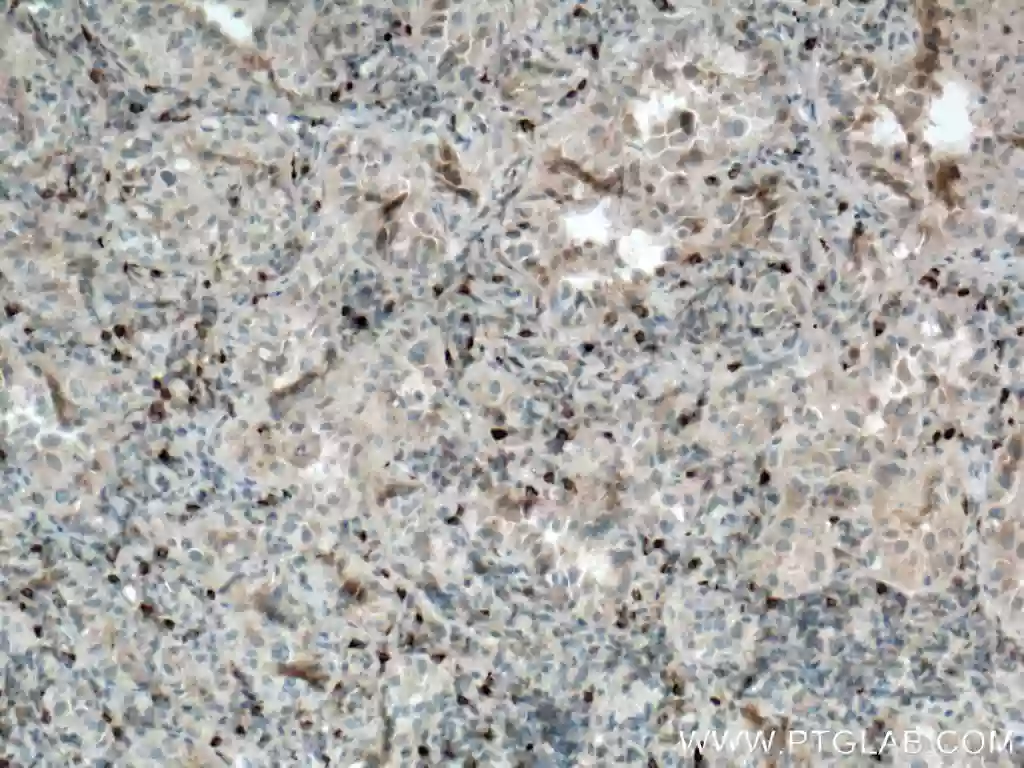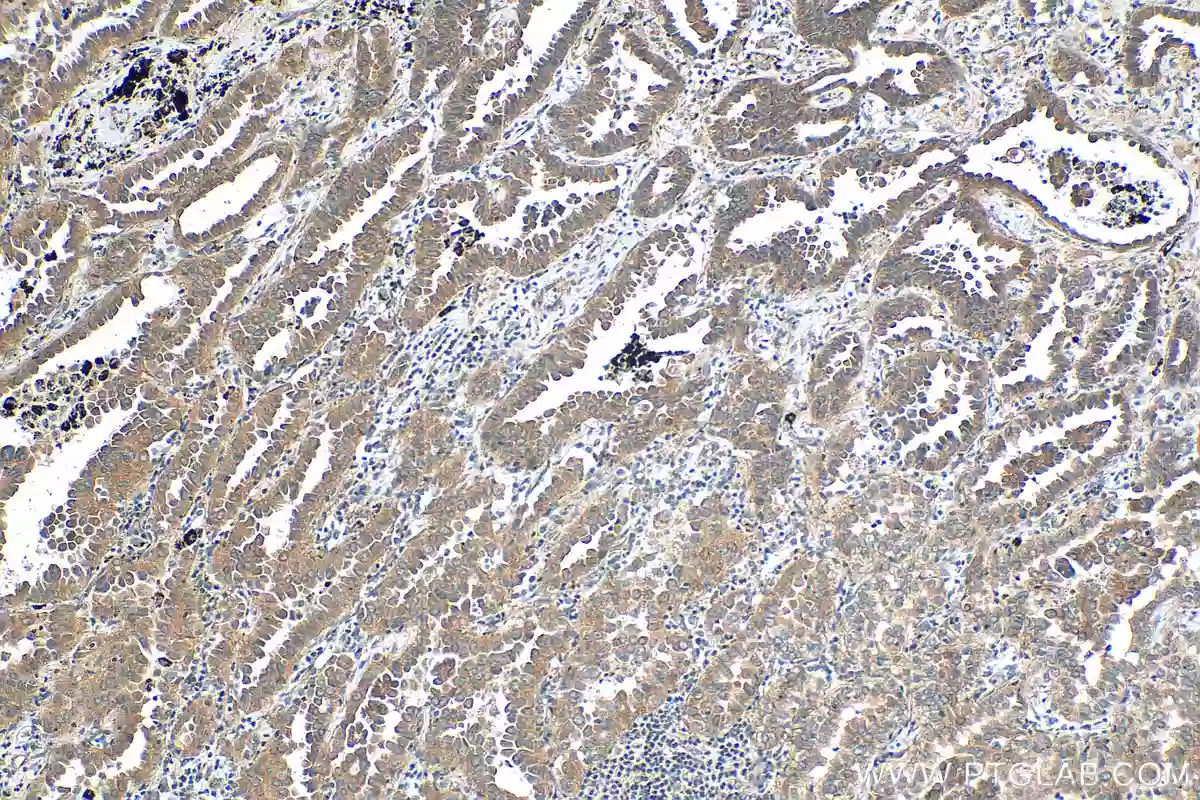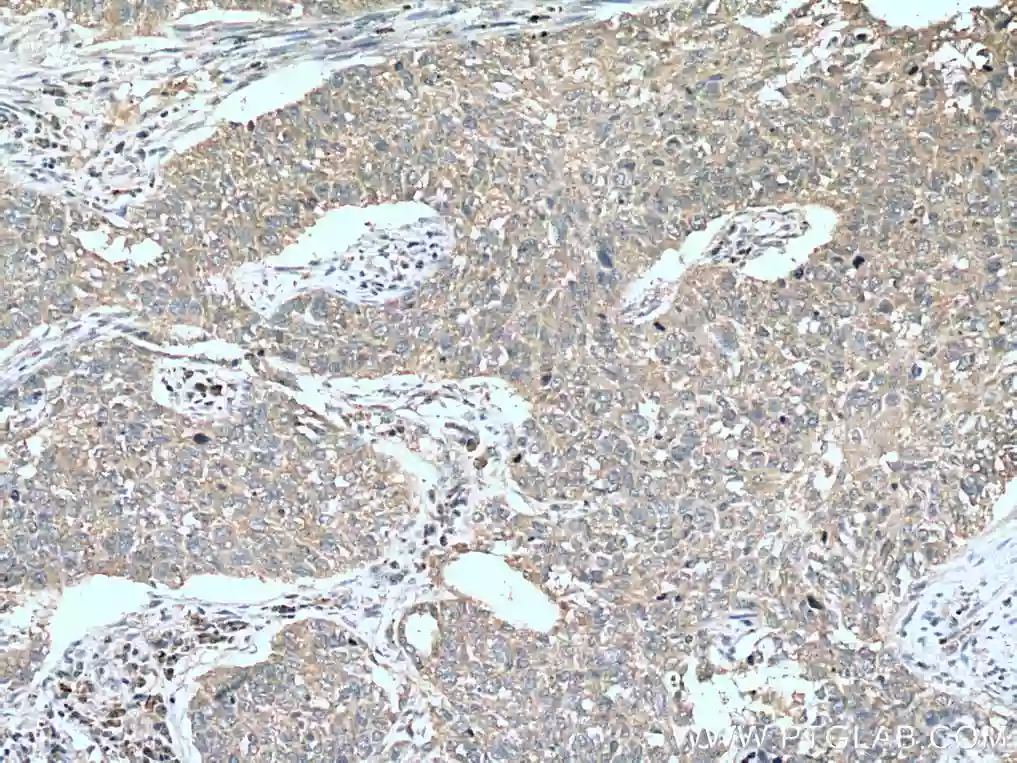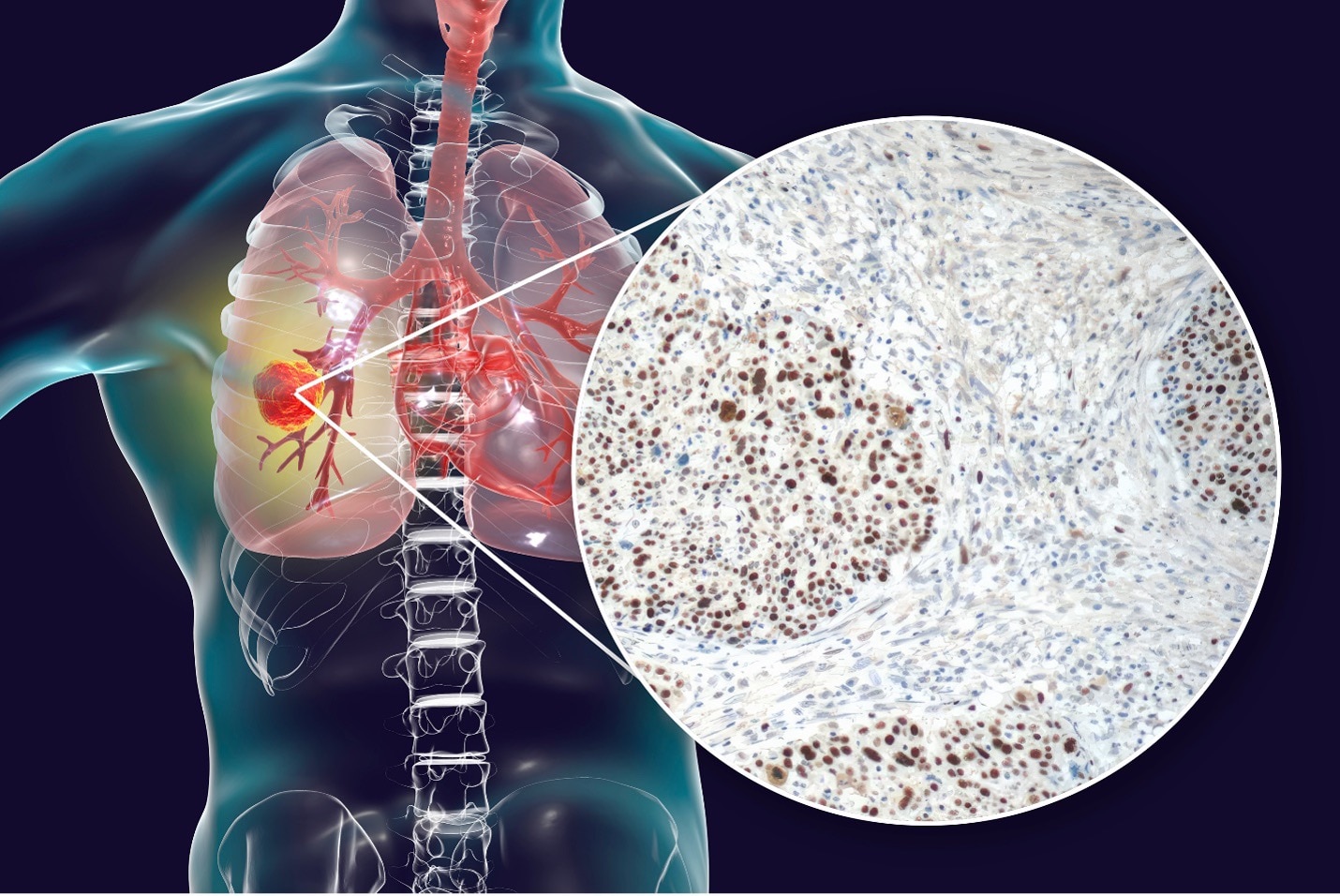Lung Cancer
Breathe easy and try Proteintech’s unparalleled antibodies and ready-to-use IHC kits to further accelerate your lung cancer research
Immunohistochemical analysis of paraffin-embedded human lung cancer tissue slide using MCM6 polyclonal antibody (13347-2-AP), the #1 cited antibody on the market. MCM6 plays a crucial role in lung cancer metastasis.
Introduction
Lung cancer is the second most common cancer worldwide and by far the leading cause of cancer-related deaths. There are two major forms of lung cancer. Non-small cell lung cancer (NSCLC) accounts for most cases and can be divided into several different types including adenocarcinoma, squamous cell, and large cell carcinoma. Small cell lung cancers account for about 10-15% of lung cancer cases but are more invasive and faster growing than NSCLC. While smoking remains the number one cause of lung cancer, exposure to toxic chemicals as well as inherited and acquired genetic mutations can also contribute towards developing this disease. Proteintech offers several antibodies and IHC kits to study disease progression and to identify existing and potential biomarkers for targeted therapies. Many of these products have already been validated in lung cancer tissue.
Featured Markers for Lung Cancer Research
KRAS
KRAS is an oncogenic protein that has the second highest rate of mutation in NSCLC behind p53. It is a member of the RAS family of proteins that coordinate several cellular activities including proliferation, survival, and cytoskeletal remodeling. KRAS mutations are often corelated with poor survival and response to treatment. Proteintech’s KRAS antibody is one of the most cited in the market, already featured in nearly 100 publications worldwide.

Immunohistochemical analysis of paraffin-embedded human lung cancer tissue slide using 12063-1-AP (KRAS antibody) at dilution of 1:800 (under 10x lens).
MET
MET is a receptor tyrosine kinase that is activated upon binding with its ligand, HGF. Ligand binding activates several downstream cellular responses including cell growth, adhesion, and motility. In lung cancer, this protein is often overexpressed or affected by gain-of-function mutations. These alterations result in dysregulated signaling and increased cancer invasiveness. Several inhibitory drugs and monoclonal antibodies have been developed to target aberrant MET activity in lung cancer.

Immunohistochemical analysis of paraffin-embedded human lung cancer tissue slide using 25869-1-AP (c-Met antibody) at dilution of 1:1000 (under 10x lens).
STK11
STK11, also known as LKB1, is a protein kinase that controls the activity of members of the AMP-activated protein kinase (AMPK) family. It is normally a tumor suppressor that functions as an upstream regulator of cell polarization, apoptosis, and the DNA damage response. However, STK11 is affected by loss of function mutations in nearly 13% of lung adenocarcinomas, which result in oncogenic functions. Lung cancers carrying mutated forms of STK11 tend to have a higher propensity for metastasis and lower overall survival.

Immunohistochemical analysis of paraffin-embedded human lung cancer tissue slide using 10746-1-AP (STK11/LKB1 antibody) at dilution of 1:200 (under 10x lens).
Antibodies for Lung Cancer
Function |
Marker |
PTG Catalog |
Angiogenesis |
12375-1-AP |
|
Cell Cycle and Proliferation |
24184-1-AP |
|
|
20899-1-AP |
||
|
11026-1-AP |
||
|
18986-1-AP |
||
|
18299-1-AP |
||
|
27309-1-AP |
||
|
12063-1-AP |
||
|
11225-1-AP |
||
|
10442-1-AP |
||
|
22034-1-AP |
||
|
27952-1-AP |
||
|
10746-1-AP |
||
|
12143-1-AP |
||
Cancer Type Differentiation |
10529-1-AP |
|
|
14255-1-AP |
||
|
28482-1-AP |
||
|
16558-1-AP |
||
|
10149-1-AP |
||
|
15105-1-AP |
||
|
26558-1-AP |
||
|
11064-1-AP |
||
|
17785-1-AP |
||
|
10366-1-AP |
||
Metastasis |
11217-1-AP |
|
|
21327-1-AP |
||
|
12289-1-AP |
||
|
20874-1-AP |
||
|
15283-1-AP |
||
|
13347-2-AP |
||
|
25869-1-AP |
||
|
23614-1-AP |
||
|
10556-1-AP |
||
Survival |
10176-2-AP |
|
|
21829-1-AP |
||
|
12834-1-AP |
||
|
26881-1-AP |
||
|
13171-1-AP |
||
|
66248-1-Ig |
IHC Kits for Lung Cancer
Function |
Marker |
PTG Catalog |
Angiogenesis |
KHC0770 |
|
Cell Cycle and Proliferation |
KHC0303 |
|
|
KHC0612 |
||
|
KHC0079 |
||
|
KHC0280 |
||
|
KHC0278 |
||
|
KHC0086 |
||
Cancer Type Differentiation |
KHC0602 |
|
|
KHC0734 |
||
|
KHC0068 |
||
|
KHC0294 |
||
|
KHC0059 |
||
|
KHC0039 |
||
Metastasis |
KHC0488 |
|
|
KHC0374 |
||
|
KHC0010 |
||
|
KHC0304 |
||
Survival |
KHC0115 |
|
|
KHC0036 |
||
|
KHC0616 |
||
|
KHC0478 |
||
|
KHC0659 |
References
Greulich, H. (2010). The Genomics of Lung Adenocarcinoma: Opportunities for Targeted Therapies. Genes & Cancer, 1(12), 1200–1210. https://doi.org/10.1177/1947601911407324
Laderian, B., Mundi, P. S., Fojo, T., & Bates, S. E. (2020). Emerging Therapeutic Implications of STK11 Mutation: Case Series. Oncologist, 25(9), 733–737. https://doi.org/10.1634/theoncologist.2019-0846
Lawrence, R. E., & Salgia, R. (2009). MET molecular mechanisms and therapies in lung cancer. Cell Adhesion & Migration, 4(1), 146–152. https://doi.org/10.4161/cam.4.1.10973
Sumbly, V., & Landry, I. (2022). Unraveling the Role of STK11/LKB1 in Non-small Cell Lung Cancer. Cureus. https://doi.org/10.7759/cureus.21078
Villalobos, P., & Wistuba, I. I. (2017). Lung Cancer Biomarkers. Hematology-Oncology Clinics of North America, 31(1), 13–29. https://doi.org/10.1016/j.hoc.2016.08.006
What Is Lung Cancer? | Types of Lung Cancer. (n.d.). https://www.cancer.org/cancer/lung-cancer/about/what-is.html
Related Content
Cancer stem cells as a key to cure cancer
Molecular markers for liver cancer

Support
Newsletter Signup
Stay up-to-date with our latest news and events. New to Proteintech? Get 10% off your first order when you sign up.
